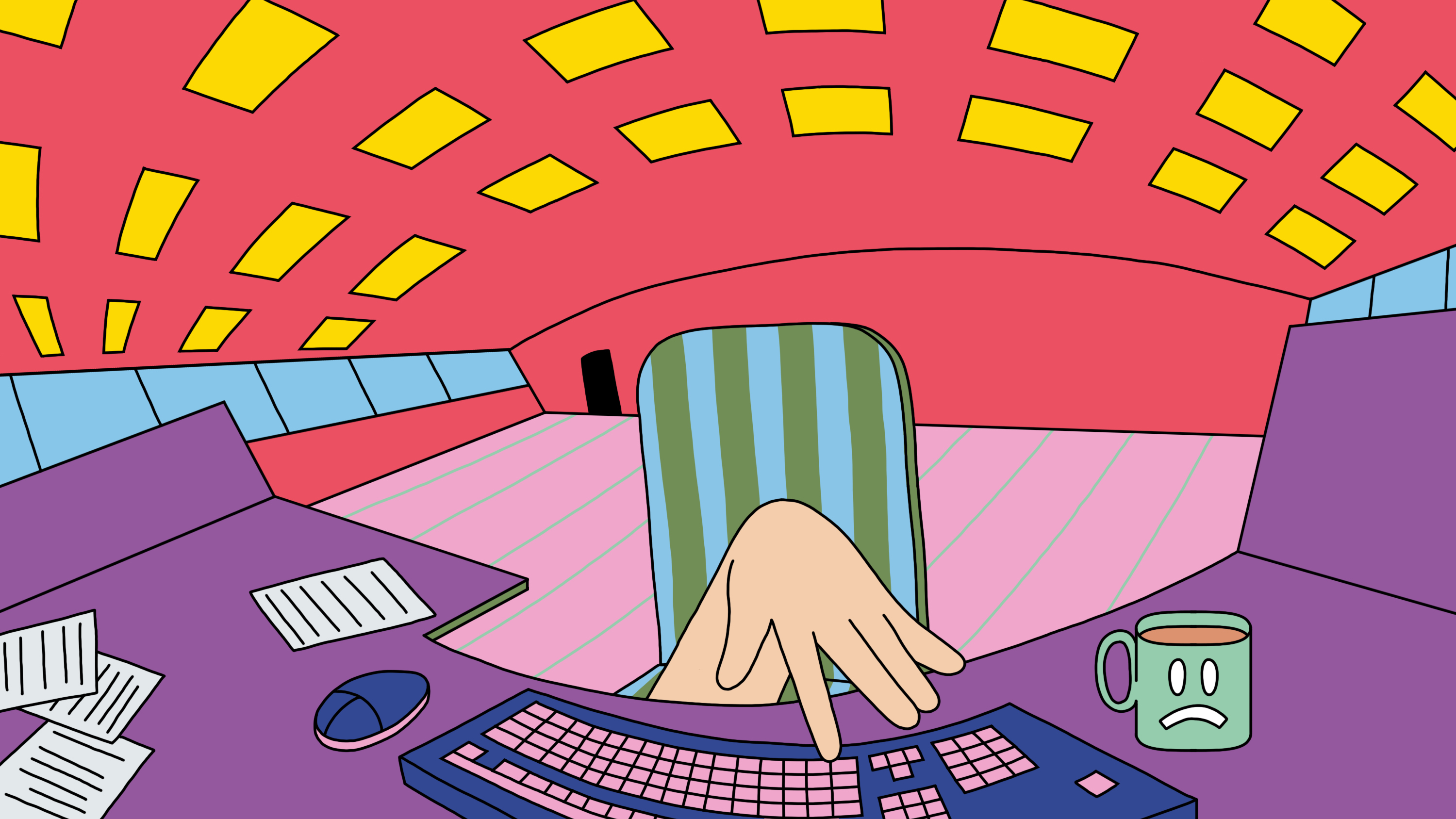This is an edition of The Atlantic Daily, a newsletter that guides you through the biggest stories of the day, helps you discover new ideas, and recommends the best in culture. Sign up for it here.
Alan Greenspan knows a thing or two about underpants. American history’s second-longest-tenured Fed chairman also knows a thing or many about recessions, obviously, and the two are related: Sales of men’s underwear, Greenspan once reportedly suggested, are inversely proportional to economic anxiety. As the theory goes, men see underwear as a luxury, not a necessity. When money gets tight, boxers get holey.
According to folk wisdom, when a recession is imminent, sales of snacks, cigarettes, champagne, and cardboard boxes also go down. Demand for lipstick, laxatives, instant noodles, used clothing, high heels, scary movies, and mini liquor bottles, meanwhile, goes up. Hemlines drop; law-school applications rise. Baby butts get rashy. Halloween gets less spooky. People gravitate toward public libraries and private labels. They spend less at restaurants. They stop dyeing their hair and dry-cleaning their clothes and going to the strip club, and they definitely do not buy an RV.
Well, supposedly. If you ask an economist, they will almost certainly tell you that a recession is indicated by things such as mounting unemployment, falling industrial production, and short-term interest rates rising relative to long-term ones. If you ask the people working at National Bureau of Economic Research, who actually make the call about a recession, they will say it is a “significant decline in economic activity that is spread across the economy and that lasts more than a few months.” They are highly unlikely to tell you that the best way to understand the state of global markets is to take a look at your ankles.
That’s not to say that pop-culture recession indicators are meaningless. A recession is a phenomenon necessarily defined in hindsight, usually long after life has changed on the ground: The Great Recession officially began at the end of 2007, but NBER didn’t announce that it had until the following December, right around when more than half a million people lost their jobs in a single month. Consumer behavior is a reactive measure of how much money people have in their pocket, which is probably why Greenspan was apparently paying attention to underwear. Many other pop-culture recession indicators—including the rise in law-school applications, the decline in demand for cardboard boxes, and the growing use of libraries and generic products—have been validated as useful signals about the health of the economy. They currently show what the more traditional indicators also show: The American economy is full of uncertainty, even though it has not yet tipped officially into recession.
But taking anecdotal intuition about individual consumer psychology and extrapolating widely can lead to some odd and unhelpful conclusions. The way people spend their money is personal, and the product of a complex set of factors. It’s also sometimes illogical. Case in point: In 2008, when the Nielsen Company did an analysis of consumer behavior during a recession, the firm’s findings indicated that whereas candy is recession-proof, soda—liquid candy—is among the most recession-prone consumer goods. And societies don’t respond to crises the same way every time. The hemline index, which holds that in bad times hemlines go down and in good times they rise, is one of the most cited pop-culture recession indicators. It originated in the 1920s, when most women didn’t work outside the home, style (and society) were far more rigid, the fashion industry operated completely differently, and the miniskirt did not exist. Even if it were possible to reliably measure hemlines on a large scale, they are also influenced, in the short and long term, by trends, weather, and norms. Economic anxiety is a powerful force, but it is not the only force dictating the way people act.
Here is what we know, according to Joanne Hsu, who runs the University of Michigan’s consumer-sentiment survey program. Generally speaking, the less money people feel like they have, the more likely they are to skip big expenses and to substitute cheaper, lower-quality goods where they can. (Indeed, sales of Hamburger Helper are up 14.5 percent this year, as sales of most luxury goods are down.) They seek out stress relief, good deals, and cheap indulgence.
They also apparently seek out economic folk wisdom. This may not be a recession, but it is definitely a boom time for talking about being in a recession. According to various reports, people are, at this moment, listening to “recession pop,” going “recession blonde,” and getting “recession nails.” Online, the recession indicator has quickly gone from pop-economic trivium to absurdist meme. Among the supposed signs of our impending economic catastrophe that whizzed past me this spring and summer like the world’s most depressing rewrite of “We Didn’t Start the Fire”: Labubus, urban lumberjacks, messy buns, capri pants, hot women in eviction court, Hot Pockets changing its packaging, the Coachella lineup dropping early, the resurgence of frozen yogurt, a new Air Bud sequel, an American pope.
Some of these are legible enough; many are ridiculous. (Recession indicator is this season’s Sir, this is a Wendy’s, the blank form through which anyone can launder a basic observation into something that sort of resembles a joke, especially if you’re not paying very close attention.) None of these meme indicators have, to my knowledge, been formally validated by the academic establishment. But I find it very telling that young people on the internet are casually invoking an arcane economic concept in order to explain the way their world feels. Maybe the ultimate recession indicator is how much people are talking about recession indicators.
Not that I blame them. “Recession indicators” are appealing like the 10-day weather forecast is appealing. We turn to them not because they are accurate, but because they offer the illusion of control. Everyone gets rained on in a monsoon, but it’s still nice to know to pack an umbrella. These little predictors make the abstract feel concrete and the future feel foreseeable, maybe even manageable. They reduce the economy—sprawling, complex, scary-big—down to something as small as a tube of lipstick. And maybe most important, they’re a quasi-academic way of corroborating your own reality—a vibe check, a pat on the shoulder, a Ph.D. for your dread. Starting in 2022, as inflation surged post-lockdowns, economists have been predicting a recession. Thus far, one hasn’t officially arrived. But try saying that to people paying $8 for eggs. “People don’t feel like they’re thriving as they should be, as they might expect to,” Hsu told me. “So I think it makes sense that people are looking for things that validate their experiences.”
Of all the unorthodox recession indicators, cardboard-box production is one of the most reliable, because cardboard boxes are a very straightforward proxy for the quantity of goods being shipped around the world. The outlook isn’t good: On Sunday, The Wall Street Journal reported that box shipments are at their lowest levels since 2016. All across the economy, people are buying less and doing less. They’re forgoing the things they really want because they cannot afford them, because they don’t have enough money. At a certain point, that’s indicator enough.
Related:
Here are three new stories from The Atlantic:
- What Republicans can do if they really want to protect free speech
- Adam Serwer: The surrender of America’s elites
- Mark Whitaker: How Charlie Kirk’s death will change his message
Today’s News
- President Donald Trump signed an executive order approving a deal that would keep TikTok operating in the United States by transferring majority ownership to American investors. This will give control of the algorithm to a U.S. joint venture. At the signing, Trump said, “This is going to be American-operated all the way.”
- Yesterday, a memo from the White House Office of Management and Budget directed federal agencies to prepare for mass layoffs if Congress does not pass a funding bill before the government-shutdown deadline on October 1.
- Defense Secretary Pete Hegseth has ordered all U.S. generals and admirals from around the world to attend an urgent meeting at Marine Corps Base Quantico next week, but provided no reason; the Pentagon confirmed the gathering but gave no further details.
Dispatches
- Time-Travel Thursdays: James Parker writes about Allen Ginsberg, the great American poet-buffoon, and the lesser-known Ginsberg who preceded him.
Explore all of our newsletters here.
Evening Read

If I Work Harder, Will You Love Me?
By Arthur C. Brooks
Between teaching MBA students and speaking to a lot of business audiences, I’m often interacting with successful people who work extremely long hours. It’s common for me to hear about 13-hour workdays and seven-day workweeks, with few or no vacations. What I see among many of those I encounter is workaholism, a pathology characterized by continuing to work during discretionary time, thinking about work all the time, and pursuing job tasks well beyond what’s required to meet any need. Workaholics feel a compulsion to work even when they are already earning plenty of money and despite getting minimal enjoyment from doing so.
Does this sound familiar?
More From The Atlantic
- What ever happened to getting to first base?
- Radio Atlantic: Testing teachers for “wokeness”
- Chatbait is taking over the internet.
Culture Break

Watch. In 2020, David Sims recommended four films to watch during the fall season.
Read. In her new novel, Will There Ever Be Another You, Patricia Lockwood captures the strangeness of ordinary life for the chronically ill, Bekah Waalkes writes.
Rafaela Jinich contributed to this newsletter.
When you buy a book using a link in this newsletter, we receive a commission. Thank you for supporting The Atlantic.
The post Some Clues That a Recession Is Coming appeared first on The Atlantic.




